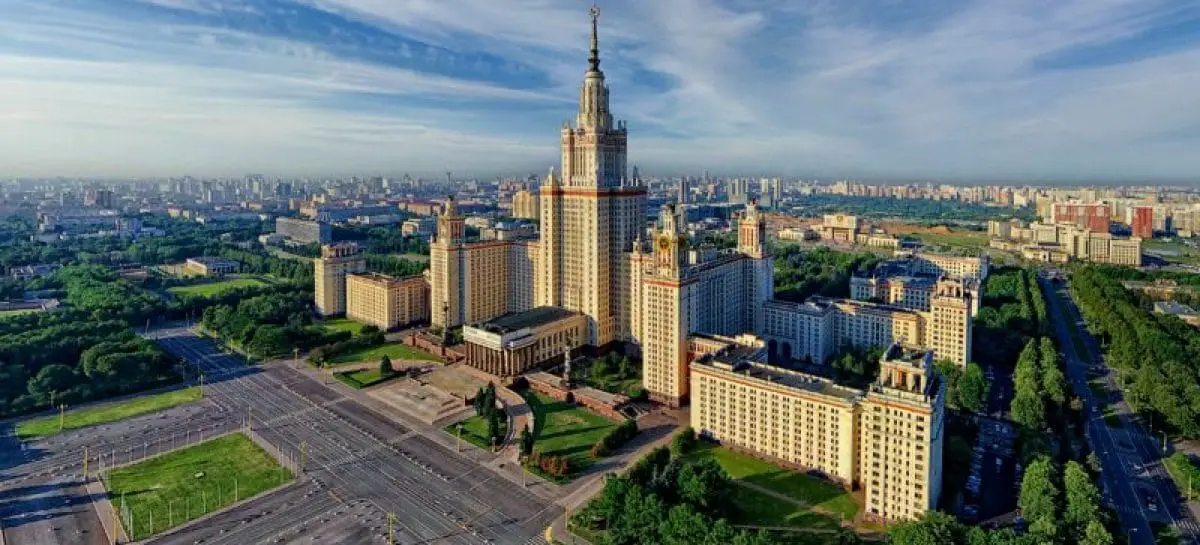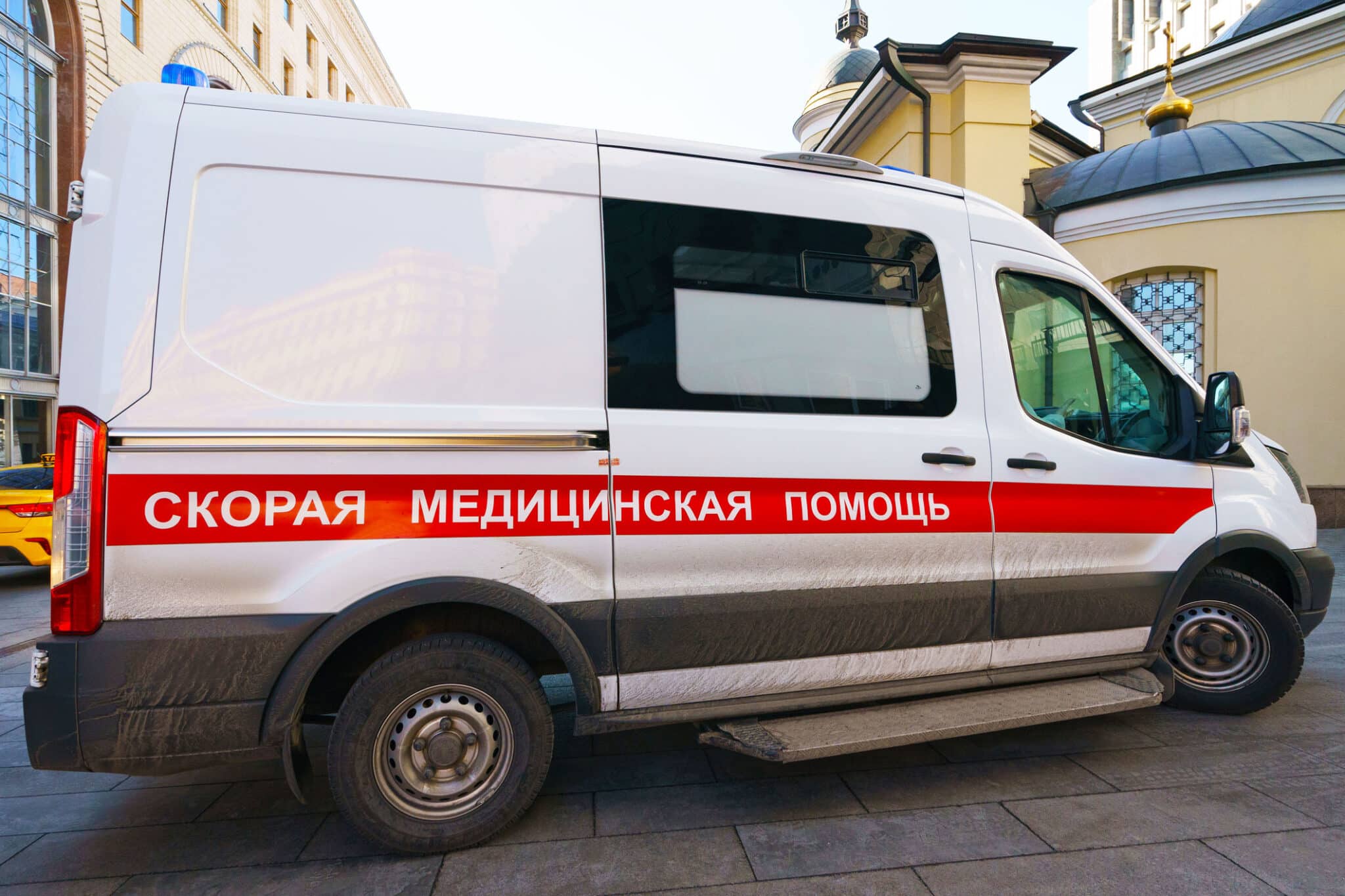Although she passed her entrance medical checkups at the start of the semester, Olga still developed a serious illness that affected her ability to attend classes and participate in her internship with SRAS. With a diagnosis of stomach ulcers, Olga was hospitalized for two weeks.
In the following text, Olga details her experience of falling ill, being diagnosed, treated, and released from the hospital in Russia. This is part of a series of free Russian lessons sponsored by SRAS called Olga’s Blog. The blog documents – in simplified, modern Russian – Olga’s experience finishing high school, starting college, and living life in Moscow in 2006. The text, links, and format of this resource were last updated in 2023.
Briefly on Sickness and Healthcare in Russia
Russia’s constitution lists access to health care as a fundamental right. Thus, all Russian citizens are provided basic insurance through the state. Russia runs an extensive state healthcare system that is largely free for preventative and basic care. Thus, for example, if a child breaks an arm, the emergency room visit, setting the broken bone in a cast, and follow up visits are all free. Although Russian doctors employed by the system are not highly paid, Russia has a strong tradition of medical education and thus most medical facilities are well staffed. Medications are also generally quite affordable as prices are highly regulated.
Thus, Olga’s description below focuses on the procedures she underwent, and the fact that she was able to be admitted to rather prestigious hospital based on her father’s status as a doctor, but she does not mention cost.
This all said, there are many drawbacks to Russia’s state medical system. As the state has struggled in recent years to make the system more efficient, many rural clinics have closed, meaning that people remaining in these areas often have to travel long distances or wait for itinerant doctor visits. In cities especially, long lines can form for medical services, especially because of frequent demands for a doctor’s certification for employment, school, and other reasons. Low pay for doctors can often mean that patients feel the need to “tip” or even bribe doctors to ensure care is given. Lastly, although treatment for routine issues such as colds or broken bones is generally of acceptable quality, most Russians who develop more complicated problems such as cancer, for instance, where the latest in technology and treatments are needed, will often seek privatized care or even care abroad.
Sickness in Russia: Simplified Russian Text from Olga’s Blog
This is Lesson 8 of Olga’s Blog, a series of intermediate Russian lessons.
Note that:
- All of the bold words and phrases have annotation below.
- Red words and phrases indicate the subject of this blog entry’s grammar lesson.
- *Asterisks indicate slang.
Дорогие друзья,
Я долго не писала вам потому, что всю весну болела. Но у меня есть хорошие новости – я поправилась, с большими усилиями закончила первый курс, и теперь буду писать вам чаще. Сегодняшний блог я решила посвятить здоровью и медицине, так как эта тема была особенна важна для меня в последнее время. Сегодня я расскажу вам о своей болезни и о лечении, которое мне пришлось пережить. Болеют все, но когда заболеваешь сам, кажется, что ты болеешь сильнее всех.
После зимней сессии у меня начались боли в животе. Поначалу я не придавала им значения, но боли усиливались. Это стало мешать моей учебе. Я пропускала лекции, плохо спала, перестала гулять с друзьями, и жизнь стала грустной. Я поняла, что заболела серьезно.
Древнегреческие врачи говорили: «Боль – это сторожевой пес здоровья». Как я поняла, это – своеобразный сигнал о том, что в организме что-то не в порядке и нужно принимать меры. Без чувства боли человечество бы погибло. Именно боль заставляет вас отдернуть руку от горячего утюга, таким образом, она охраняет вашу руку от ожога, как сторожевой пес охраняет дом от воров. Об этом рассказал мне папа, он военный врач.
В госпитале, где он работает, мне несколько раз пытались сделать гастроскопию, но всякий раз, как я видела эту штуку, меня охватывала паника, и я категорически отказывалась от этого исследования. Мне назначали какие-то таблетки, но я не выздоравливала, болезнь все сильнее захватывала меня. Тогда я решилась на это исследование.
Эндоскопическое исследование моего желудка началось с того, что медсестра брызнула мне в рот какой-то гадостью. Это была анестезия. Как только я перестала чувствовать язык, меня уложили на стол, вставили в рот пластмассовое кольцо, наверное для того, чтобы я никого не покусала. В руках у врача появился эндоскоп. Этот инструмент был похож на черную змею. Казалось, что даже врач боится его. На конце эндоскопа светилась то ли лампочка, то ли глаз. Остальное из-за страха я помню смутно, но все прошло очень быстро. И этот глаз увидел в моем желудке огромную язву. Мне показали ее на экране монитора. Выглядела она противно. Как ни странно, врачи, в том числе и мой папа, были довольны, что нашли причину моей болезни. Я оказалась в больничной палате.
Как дочь офицера я могла лечиться в военном госпитале бесплатно – существует такая льгота для членов семей военнослужащих. И военные лечебные учреждения имеют более высокий статус, чем гражданские. В госпитале мне сделали кучу тестов и анализов, чтобы определить причину возникновения язвы. Причину я так и не узнала. Две недели мне почти не разрешали двигаться из-за опасности кровотечения из язвы, делали уколы, давали таблетки. Еду приносили в палату. Каждое утро приходил мой лечащий врач, разглядывал мой язык, щупал живот и что-то записывал. Затем повторили гастроскопию, ее я выдержала более спокойно. Результаты были положительные – язва зарубцевалась. Меня выписали домой.
Хотя я и выздоровела, но, к сожалению, я пропустила важные лекции и семинары. Мне пришлось догонять остальных и наверстывать упущенное – переписывать лекции, чаще сидеть в библиотеке, брать дополнительные задания у преподавателей. Я старалась, но, тем не менее, пробелы в своих знаниях восстановила не полностью. Это отразилось в дальнейшем на результатах моих экзаменов, о которых речь пойдет в следующий раз.
Vocabulary and Cultural Annotations
Посвятить / Посвящать (что-л./кого-л.): To dedicate or devote. It is also used in church terminology to mean “to consecrate” or “to ordain.”
Придавать / Придать (кому-л./чему-л.) значения: To give meaning/significance to. In this sentence, Olga’s thought could be translated as “I tried not to give it much thought.” This verb can also be used in several other interesting uses such as “придавать (кому-л./чему-л.) духу” — which means “to inspire,” or “to encourage.” “Придавать (чему-л.) вкус” means “to give something flavor.”
Своеобразный: Unique
Принимать / Принять меры: To take action. Another important usage of this verb in this particular theme is “принимать лекарство,” “to take medicine.” More interesting usages include “принимать гражданство,” to be naturalized (as a citizen); “принимать христианство,” to adopt/accept Christianity; “принимать должность,” to accept a post (in a government, organization, etc.); and “принимать на себя” — to take responsibility for someone or something.
Госпиталь: Hospital, particularly a hospital connected with the military. Note “hospital” is most often translated as “больница,” but those hospitals connected with the military (military hospitals, field hospitals, etc.) are usually known as “госпитали.”
Гастроскопия: Gastroscopy. Many words connected with modern medical procedures and technology are very similar in Russian and English. Likewise, the machine used for gastroscopy is known in Russian as a “гастроскоп” and in English as a “gastroscope.” However, many other words, such as those for bones and many diseases can be very different. For instance, the word for “femur” is “бедро” and the word for “leprosy” is “проказа.” While most medical doctors in Russia will know only the Russian and Latin versions of these names, many Russian medical students are now required to learn the English versions as well. Please note as well that while this old/new rule for looking for similarities between English and Russian is not right 100% of the time, it is helpful.
Эндоскопическое: Endoscopic. “Endoscopy,” or “эндоскопия,” is a more general term that can refers to any procedure which looks inside the body for medical reasons.
Гадость: Vileness. This is a very general and oft-used Russian word to describe anything unpleasant from objects and liquids to acts and words. Take, for example, the phrase “говорить гадости,” “to say foul things.”
Анестезия: Anesthesia. Anesthesia is actually a relatively modern phenomenon – having been developed to its modern state in the late 1800’s largely by the British and the Americans. This is one reason why this word is, like the more modern “gastroscope,” similar between the two languages.
Смутно: Vaguely. In its adjectival form “смутный,” the word can also mean “anxious,” and “troubled” in addition to “vague” or “dim.”
Язва: Ulcer. In Russian, this word can also refer to canker sores (“гангренозная язва”) and to the open sores caused by plague “моровая язва.” This ancient word can also be used to refer to a malicious person.
Возникновения: Source or beginnings.
Укол: Injection (or prick).
Палата: Ward, chamber, or room. In this case, it refers to the room where Olga’s hospital bed was. The word is also used in such cases as “Американская торговая палата,” the official translation of “The American Chamber of Commerce.”
Лечащий врач: Attending physician (the one in charge of a particular patient’s diagnosis and treatment).
Щупать / Пощупать (что-л./кого-л.): to feel, touch, or probe. In this (specifically medical) case, the word would most accurately be translated as “palpate.”
Зарубцовываться / Зарубцеваться: A very specific Russian term meaning “to scar” or “to scar over.”
Догонять / догнать (кого-л./что-л.): To catch up, peruse, or overtake. Drivers will also appreciate the verb “обгонять / обгнать (кого-л./что-л.),” which is used in the sense of “to pass” or “to outrun.”
Пробел: A gap, blank, or flaw. In this particular case, “пробелы в (своих) знаниях” literary means “gaps in (one’s) knowledge.”
Отражать / Отразить (кого-л./что-л.): to reflect or deflect.
More Free Russian Lessons From Olga’s Blog

The Language and History of Caviar: Olga’s Blog
Olga below describes the place of caviar in Russian food culture. In simplified Russian, she describes where the delicacy is harvested from, the major types of caviar, and how the types differ in cost and quality. We also provide an English primer below discussing more of the history of caviar, how it is eaten and […]

Mushrooms in Cultures and Cuisines: Olga’s Blog
Olga below continues her discussion of the deeply held place that mushrooms have in Russian culture. In part one of this discussion, she focused on how and where and find the mushrooms. In part two, below, she discusses how the mushrooms are preserved, prepared, and consumed. A staple of the regional diet for centuries, mushrooms […]

Mushroom Season Has Begun! Olga’s Blog
Olga below discusses the deeply held national tradition of mushroom gathering. An important part of Russian food tradition for many centuries, Russian children are taught in school from an early age to tell the difference between various types of native mushrooms. Many, like Olga, will go with relatives and friends to the woods to put […]

Study Abroad in America for Russians: Olga’s Blog
As part of her major program in international relations at Moscow State University, Olga applied to study abroad in the United States in 2007. As was not uncommon for students applying for study abroad in either direction, Olga hit several bureaucratic snags. What is perhaps most remarkable about the below text, however, is the description […]

What is the First Day of University Like in Russia? Olga’s Blog
Below, Olga discusses what a first year freshman experiences on day one of their college education. The day offers no classes. It is instead filled with speeches, handshakes, and status symbols. All of this is highly indicative of the role of formality and ceremony in Russian education and Russian society. This resource is part of […]







